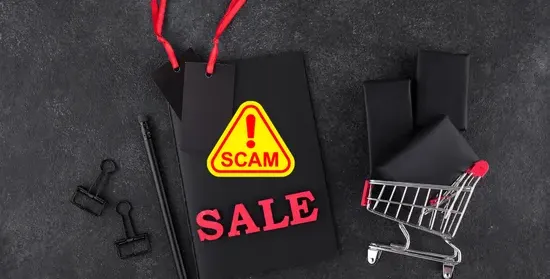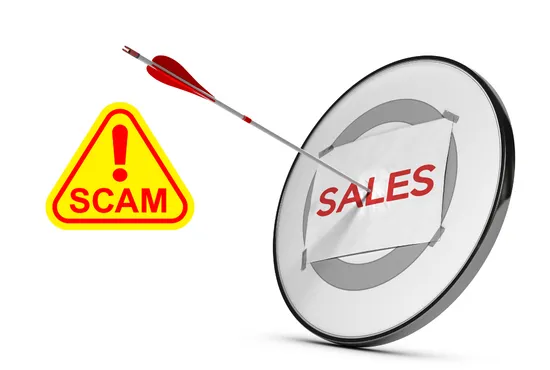
The Most Common Sales Scams
Sales scams are fraudulent sales tactics that aim to deceive consumers and convince them to buy goods or services they don't need. These schemes can come in many different forms, from bogus offers of free trial periods to false claims about the product or service being sold. No matter what form the scam takes, it’s important for consumers to be aware of these practices so they don’t fall victim to them.
With Black Friday, the biggest sales period of the year began. For fraudsters, this is the perfect time to get rich. So you need to be particularly vigilant of all the different types of offers you are likely to see over and over again. You also need to be aware of the techniques that some legitimate companies use to give you the impression that you will save a lot by buying from them.
What are the most common discount scams techniques?

Scammers often target people looking to make a purchase and they use deceptive tactics to try and get away with their scams. Here are some of the most common sales scams that you should watch out for:
1. Fake discounts – many scammers will advertise products at an incredibly low price in order to entice consumers into purchasing them. However, when the consumer receives their product, it is always a much lower quality than what was advertised or has no resemblance to what was shown in the advertisement.
2. Bogus websites – Some scammers create fake websites that appear legitimate but are actually just fronts for collecting credit card information from unsuspecting buyers. Be sure to double check any website before entering your payment information as these sites can be difficult to spot.
3. Phishing – phishing is a term used for when scammers send emails which appear to come from legitimate companies in order to get personal information from the recipient. These emails often contain links that lead to malicious websites or asks for payment information and should always be deleted without responding.
4. Online auctions – while there are legitimate online auctions, many scammers use them as an opportunity to sell counterfeit merchandise at discounted prices. It is important to research any seller before making a purchase, especially if they have little or no feedback from previous buyers.
5. Upselling – upselling is a technique used by salespeople in order to convince customers into spending more money than they initially intended. Be sure to only purchase what you need and don’t be swayed by the salesperson’s promises of extra benefits or discounts.
6. Scammers often impersonate well-known companies and present very attractive competitions and promotional campaigns on social media, allegedly organised by the brands they pretend to be.
What to look out for at the time of sale?

Many companies around the time of a sale start using certain techniques that are implicitly designed to increase sales and give you the feeling of huge savings. These may not be great scams, but they are certainly not exactly ethical behaviour that you need to be aware of. What do you need to watch out for?
- If you are thinking of buying some clothes or equipment a few weeks before the sales, check what is in the shops and what you would like to buy. Write down prices or take screenshots. Unfortunately, it's very common for shops to raise prices before the sales themselves and then give you a discount on them. If you didn't know the price beforehand you might think it's a huge saving. You end up saving nothing.
- During sales, don't buy anything just because it's cheap. Think about whether you actually need the item.
- Beware of offers like - BUY 2, get 1 FREE or being persuaded to buy an extra product when making a payment. You may save a little, but always consider whether you need the same things. If it's going to sit at the bottom of your wardrobe for another year, don't buy it.
- During sales, companies try to get rid of items that are selling less well or are sitting in warehouses. Beware of poor quality.
Scam sales warning signs

It's important to be aware of the various signs that indicate you may be a victim of a scam. Here are some warning signs to keep in mind:
1. The offer seems too good to be true. If an offer looks like it’s too good to be true, it probably is. Be sure to do your research and ask questions before making any purchases from unfamiliar sellers.
2. You didn't initiate the contact. If you receive an unsolicited email or phone call about a product or service, it's likely not legitimate. Scammers will often try to reach out and deceive people with false promises and claims, so always make sure you know who you're dealing with before engaging in any transactions.
3. The company is not registered. Before signing any contracts or committing to a purchase, be sure to check that the company you're dealing with is legitimate and properly registered. This can help ensure that your rights as a consumer are protected.
4. You're asked for sensitive information. Scammers will often try to get personal or financial information such as contact details, credit card numbers, bank details in order to commit fraud or scam you out of money. Never give this type of information out unless you know who you're dealing with and trust them completely.
5. You feel pressured into making a decision. If you're feeling pressured to make a purchase, immediate payment or sign up for something, it's likely a scam. Trust your instincts and take your time before making any decisions.
6. You have doubts about the website address. Check the website URL - make sure the website you're visiting is legitimate before entering any personal or payment information.
7. Resistance to accepting payment through more secure means like credit cards or third-party services like PayPal.
8. Retailers that do not provide information about privacy, dispute resolution, or ways to contact.
9. It happens that scammers set up a social media account just before publishing information about a supposed competition or promotional action. Often, the post with the scam is also the only one published by this profile. We can protect ourselves from scammers by checking the date the profile was created, other posts published on it and the number of likes on the account (official fanpages of popular brands often have many thousands of likes).
10. Pay attention to the photos in the sales offer or on the website. They are often stolen from other sites.
11.. It is also worth paying attention to grammatical correctness, as sometimes content posted by fraudsters is originally written in another language and only later translated.
By keeping these warning signs in mind, you can better protect yourself from becoming a victim of a scam. Don't be afraid to ask questions and do research if something doesn't seem right. Being aware of risky situations can help you spot and avoid scams.
Summary
Due to the ubiquitous discounts, scammers are also taking advantage of this for quick and easy earning of large sums of money and a guaranteed income without leaving home, regardless of education and experience. Beware of all kinds of investment scams, crypto scams, whose main purpose is to access the victim's bank account. These scams tend to grown last years.
By being aware of these common sales scams, you can protect yourself from becoming a victim of fraud. If you ever feel like something isn’t right about a sale or transaction, it is important to trust your gut instinct and take action to ensure your safety. With just a bit of caution, you can avoid falling prey to unscrupulous scammers. Watch out the adverts on classified websites and remember not to share any personal and financial information.
If you think you may have been scammed, contact your local police or Action Fraud immediately and report the fraud to your bank.
The best way to avoid becoming a victim of an online sales scam is to stay informed and remain diligent when shopping online. If something seems too good to be true, it probably is, so it’s important to take the necessary steps for staying safe. With proper knowledge and caution, online shoppers can successfully make purchases without fear of falling prey to scams.